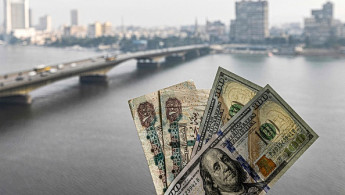Egypt's central bank adopts flexible exchange rate for pound to dollar
On Wednesday, the Central Bank of Egypt (CBE) implemented an exchange rate flexibility, allowing the value of the Egyptian pound to be regulated by market forces as an attempt to alleviate an already ailing economy.
The CBE also raised interest rates by 600 basis points (6%), marking the second rise of the year, said the CBE in an official statement.
As inflation continued to surge, "the domestic economy has been recently weighed down by foreign exchange shortages, resulting in the existence of a parallel exchange rate market and constraining economic growth, as inflation continued to grow," the statement read.
"To ensure a smooth transition, the CBE will continue to target inflation as its nominal anchor, allowing the exchange rate to be determined by market forces," the CBE added.
Following the much-awaited move on Wednesday morning, the value of the Egyptian currency has fallen sharply against the US dollar. One US dollar equals about 50 EGP at the time of publication compared to nearly 30.90 EGP on the previous day.
When contacted by The New Arab, a parallel market trader said, on condition of anonymity, due to the illegal nature of their trade, that "the informal foreign exchange has stopped all operations for the day till they have a clear picture of the value of foreign currencies against the pound."
"Such gap is expected to be bridged at least for now, which is a major blow to informal exchange market traders," financial analyst Ahmed Hamouda told TNA.
"The prices are not expected to change much, though, for it is known that they had been controlled as per the unofficial value of the US dollar," he added.
Earlier this week, CBE revealed a decline in the country's net foreign assets (NFAs), reporting a negative 841.391 billion EGP in December 2023, compared to a negative 831.924 billion in Egypt in November.
The Egyptian economy has long been impacted by the divide between the official value of foreign currency and how it is worth in the parallel market.
Egypt's central bank also instructed banks to open the limit for using credit cards after it had only allowed a total of 250 USD per month.
For months, businesses and travellers have resorted to the informal market, primarily to secure their needs for the US dollar in a country dependent on importation rather than local production, especially wheat, the most strategic commodity.
Even state institutions have reportedly been buying US dollars from the black market amid an extreme shortage of greenbacks.
The Egyptian pound has been struggling against the US dollar for months, leading prices of essential commodities to hike, especially wheat, rice, sugar, and cooking oil, which has taken a toll on low and average-income households.
In October 2022, the CBE floated the Egyptian pound to save an already ailing economy and abide by the rules stipulated by a loan programme offered by the International Monetary Fund (IMF).
The initial agreement dictated that Egypt would benefit from a US$3 billion loan over 46 months under the IMF's Extended Fund Facility (EFF), provided that the country loosens state and military control over the economy and adopt exchange rate flexibility.
According to unconfirmed statements, the IMF loan is expected to increase.
Amid economic challenges, foreign debts, and a significant budget deficit, Egypt has also been aggressively pursuing the sale of state assets to address its financial woes, being an easy way out, such as the recently signed Ras El-Hekma deal with the UAE.
Last week, the government received US$15 billion over two batches from the Ras El-Hekma deal forged with the UAE.




 Follow the Middle East's top stories in English at The New Arab on Google News
Follow the Middle East's top stories in English at The New Arab on Google News
![A group of Palestinians, foreign and Israeli activists gather to participated in an olive picking event on the land in the town of Battir, which is under threat of confiscation by Israel in Bethlehem, occupied West Bank on 8 November 2024. [Getty]](/sites/default/files/styles/image_330x185/public/2182930803.jpeg?h=199d8c1f&itok=__0LgGsa)

![People gathered around the rubble of destroyed houses to search for survivors [Getty]](/sites/default/files/styles/image_330x185/public/2024-11/GettyImages-2184733820.jpg?h=199d8c1f&itok=NiM1LO2f)